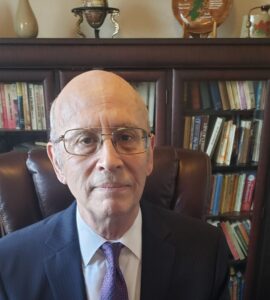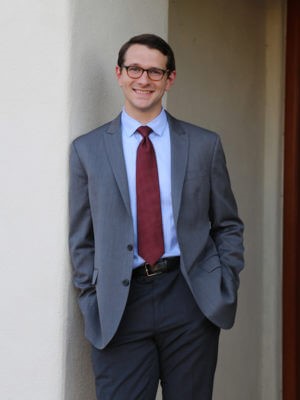Every month, Southern Arizona Legal Aid’s Volunteer Lawyers Program (VLP) recognizes a legal professional for their legal voluntarism. The award is a distinct honor. Of the 533 attorneys and paralegals who volunteer their time, twelve are recognized annually for their dedication to access to justice.
Steve Simon is the January 2021 Outstanding Volunteer of the Month Award Recipient.
Although Steve is a relatively new volunteer at SALA, beginning in summer 2020, he is now very involved in employment law clinics and in direct cases at the Tucson and Casa Grande offices. Two direct representation cases stand out to him as being the most rewarding to work on so far. One involved a successful resolution of an improvident USDA claim for a foreclosure deficiency, which the USDA agreed to rescind, and another entails a defense against an HOA’s attempt to foreclose on a client’s home equity despite a verbal agreement to a payment plan for HOA assessment arrearages. The latter case is ongoing as of the date of the interview for this article. When SALA transitioned from in-person to remote videoconferencing due to COVID-19, Steve took on the challenge of participating in employment law clinics through remote videoconferences. Clients have expressed to the VLP staff how helpful he has been in listening to their legal issues and providing them with the legal guidance they need.
Originally from Texas, Steve grew up in Virginia. He attended the Pennsylvania Military College, before going on to earn a degree in International Relations, studying International Politics and History at Florida State University. After college, he first joined the Army as a Tank Officer serving with 3/35 Tank Battalion and a Division Operations Officer in Germany, then entered the Virginia National Guard as an Armored Cavalry Officer, and finally joined the Marines where he was again a Tank Officer with 3rd Marine Tank Battalion at 29 Palms California. He later signed up for JAG program and began law school at William and Mary in 1981. After law school, he served as Trial Counsel and Defense Counsel at Marine Corps Base 29 Palms, prosecuting and defending Marines in trials by courts martial, as a Legal Assistance Officer providing general practice advice and counsel to Marines and Sailors, and also serving as the Headquarters Battalion Executive Officer. He then served for three as Deputy Judge Advocate and Japanese Jurisdiction Officer for the Marine Base in Okinawa, Japan, practicing International Law, Japanese law and employment law for civilian employees. During these years, he and his family enjoyed living in Japan, and his two daughters went to school off base with Japanese and American children.
Steve then returned to the U.S. and served as a Deputy SJA at Camp LeJeune in North Carolina in Marine Corps Force Service Support Group overseeing logistics before being deployed in the fall of 1990 to Saudi Arabia during the First Gulf War with the Marine Corps Direct Support Command for Operations Desert Shield and Desert Storm. During the war, he worked as a Deputy SJA, managing criminal cases and advising on how to deal with prisoners of war and with disposing of captured enemy property. Although the crime level on the Al Khanjar base was relatively low due to the Saudi prohibition of alcohol, there were times when practicing law at this time and place was challenging. The legal office was in a dugout bunker, and during the Battle of Khafji, the Iraqi forces first feigned an attack on the Al Khanjar base, before attacking the town of Khafji. From the top of the legal office bunker, he also observed the detonation of a line charge creating the breach through the Iraqi minefield through which Marine Forces launched the attack to liberate Kuwait.
After the war ended, he moved to Phoenix in 1992 and practiced Labor and Employment Law for 27 years with the Federal Bureau of Prisons.
Steve’s career high points are quite varied and interesting, given his wide range of legal experiences. During his time practicing with the Bureau of Prisons, he was successful in establishing favorable precedent in two FSLA wage and hour cases out of California opposing the prison employee union. In these cases, the claims sought compensation in the millions of dollars for pre and post-employment time. These were difficult cases, involving arbitrators who often had one foot in both camps, and, given the financial magnitude of claim amounts, threatened the economic viability of public civil service correctional services employment and of publicly run prisons as opposed to privately operated prisons. Another challenging case Steve worked on involved three employees of Federal Correctional Institution (FCI) Talladega, Alabama who had affairs with the wives of two inmates who were sisters in law. One of the inmates learned of the affair and, after being released from prison, was accused of murdering his wife. A local news station became aware of the affair after the surviving sister-in-law called in to report that her brother-in-law had committed the murder. In this case, Steve had to prove that the employees knew that the women were wives of the inmates. To prove this, Steve interviewed the two children of the deceased woman. One of the children was old enough to testify as a credible witness that the employees knew their father was an inmate. According to Steve, this was a very difficult case to navigate; yet he was ultimately able to prove employees’ knowledge from the testimony of the surviving sister-in-law and the child.
The craziest thing Steve has witnessed in a courtroom happened during another employment civil service merit systems administrative hearing at FCI Talladega. The case involved a Federal Prison supervisor who had allegedly bullied employees and had gotten away with it for years until he finally went too far and was demoted. The employee filed an appeal challenging the demotion and the numerous bullying charges, which included a finding that he had attempted to wrongfully take IT equipment from another department by bullying a secretary who was the only person in an area during a lunch period. The secretary who had tried to stop him from taking the equipment was on the stand, testifying to how he had verbally harassed her to the point that she was in tears and had to put the IT manager on the phone to speak with the alleged bully. On cross-examination, the secretary admitted that the demoted employee immediately left the area after speaking briefly to the IT manager with the implication being that the demoted employee couldn’t have been such a bully if he promptly left after the phone call. The demoted employee then called the IT manager to testify and he verified that the demoted employee said OK and hung up after a brief conversation. On cross-examination, Steve asked the witness (the IT manager) to tell the administrative judge what his exact words were to the appellant, and he said, “I told him that if he didn’t leave the girl alone, I would come down there and whoop his ass!” The judge subsequently denied the appeal.
The qualities Steve admires most in a lawyer are professionalism and honesty. An area of law that intrigues him is maritime law, which he studied in law school and which has a strong employment law context, though he did not have an opportunity to practice. His real-life hero is Clarence Thomas, and his favorite book is the Bible. An interesting hobby of Steve’s is that he is a bit of a polyglot who enjoys learning new languages. He learned Spanish in high school, German, French, Russian, and Latin in college, later taught himself Hebrew after moving to Arizona, and took classes to learn ’O’otham.

For questions or comments about this blog, please contact us at: Connections@sazlegalaid.org



